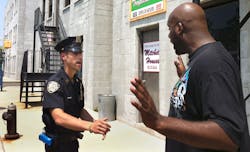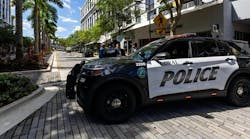The Patrolmen’s Benevolent Association is filing a lawsuit Tuesday, challenging a new City Council racial-profiling law to make sure the case is heard — no matter who is elected mayor next month.
In seeking to undo Local Law 71, the police union is arguing that the measure will subject cops to a barrage of unjustified lawsuits by plaintiffs claiming they were racially profiled during stop-and-frisk encounters.
The Bloomberg administration had challenged the constitutionality of the council’s law in September, under the very same grounds now cited by the PBA — arguing that the legislation is preempted by the state Criminal Procedure Law, which already makes police racial profiling illegal.
But police and union officials are certain that a victory in next month’s mayoral election by Democratic front-runner Bill de Blasio would doom the chances of the law being rolled back after legal review.
De Blasio has been an ardent critic of existing NYPD stop-and-frisk policies — and police- union officials are convinced he’d seek to drop the city’s lawsuit if elected.
“[PBA President Patrick] Lynch wants to assure that the challenge goes forth,” one PBA official explained.
In announcing the planned lawsuit, Lynch used similar language cited by the city to insist that the new law is baseless.
“We believe that the City Council overstepped the bounds of its authority,” Lynch said.
The PBA lawsuit, a copy of which has been obtained by The Post, contends the City Council law is “unconstitutionally vague.”
The law also requires the cop on the beat to possess more legal training than the most sophisticated constitutional lawyer, the PBA suit contends.
The law “necessarily leaves police officers to guess, on pain of civil and potential contempt liability, as to the meaning of several provisions” of the legislation, the lawsuit states.
Such provisions include “whether they have engaged in prohibited ‘bias-based profiling,’ whether they have ‘initiated[ed] law-enforcement action against an individual,’ whether such action ‘was justified by a factor[s] unrelated to unlawful discrimination,’ and how ‘the determinative factor is initiating law-enforcement action’ is to be assessed.”
The council passed its racial- profiling bill June 26, broadening the categories of those protected from profiling.
It allows those who assert they’ve been subjected to biased-based profiling to sue the city, although there’s no provision to allow for monetary awards.
Bloomberg had vetoed the same bill in July, claiming state law already banned racial profiling.
The council overrode Bloomberg’s veto on Aug. 22, enacting the racial-profiling law and establishing an inspector general to monitor the NYPD .
Republished with permission of The New York Post



